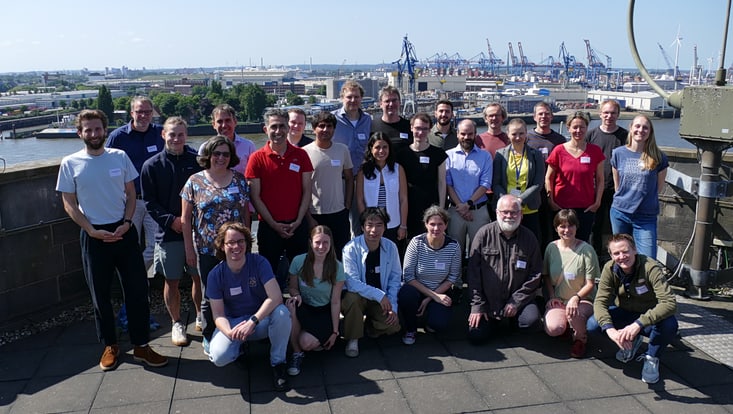ResearchEliciting user needs through focus groups
13 February 2025, by Fabian Rüsenberg (FUB)

Photo: Designed by Freepik (www.freepik.com).
We conducted four online focus groups with experts from the agriculture and forest sector in Germany, to elicit user needs regarding decadal climate information.
This article is related to Task 2.1 Evidence-based development and evaluation of products and communication formats.
Between January 27th and February 11th, we conducted four online focus groups with experts (N = 24) from the agriculture and forest sector in Germany, to elicit user needs regarding decadal climate information. The experts were (applied) researchers from renowned federal institutions or universities as well as members of state agencies, extension services and/or consultants, with backgrounds reaching from biology to economics and engineering. We chose the agriculture and forest sectors due to the following reasons:
- The IPCC identifies heat and drought stress on crops and plants as well as water scarcity as key risks for Europe (Bednar-Friedl et al., 2022).
- According to the 2021 risk analysis of the Umweltbundesamt (Federal Environment Agency), these sectors are the action fields with the highest climate risk for Germany, assuming a strong climate change and considering the current federal action plan APAIII.
- From existing collaborations between the Deutscher Wetterdienst (DWD) and the water and forest sector there is evidence that decadal predictions inform planting decisions as well as water management strategies (e.g., Dunstone et al., 2022).
- Our predecessor project MiKlip showed potential skill in sector-relevant indices like Growing Degree Days (Moemken et al., 2021).
Before the focus groups we collected sensitive weather- and climate-dependent decisions and their information needs via an online survey among the participants. Within the groups we then discussed the status quo of weather and climate adaptation, important adaptation decisions, the role of climate information in decision processes and the handling of uncertainties.
As intermediaries between research and practice, this process-oriented and demand-driven approach of climate services starts from the question what is needed for better decisions (Findlater et al., 2021) and hopefully will contribute to the research priorities already identified for climate services: "Understanding requirements, decision-making contexts, and foresight for climate services." (Hewitt et al., 2021).
References:
Bednar-Friedl, B., R. Biesbroek, D.N. Schmidt, P. Alexander, K.Y. Børsheim, J. Carnicer, E. Georgopoulou, M. Haasnoot, G. Le Cozannet, P. Lionello, O. Lipka, C. Möllmann, V. Muccione, T. Mustonen, D. Piepenburg, and L. Whitmarsh, 2022: Europe. In: Climate Change 2022: Impacts, Adaptation and Vulnerability. Contribution of Working Group II to the Sixth Assessment Report of the Intergovernmental Panel on Climate Change [H.-O. Pörtner, D.C. Roberts, M. Tignor, E.S. Poloczanska, K. Mintenbeck, A. Alegría, M. Craig, S. Langsdorf, S. Löschke, V. Möller, A. Okem, B. Rama (eds.)]. Cambridge University Press, Cambridge, UK and New York, NY, USA, pp. 1817–1927, https://doi.org/10.1017/9781009325844.015 .
Dunstone, N., Lockwood, J., Solaraju-Murali, B., Reinhardt, K., Tsartsali, E. E., Athanasiadis, P. J., Bellucci, A., Brookshaw, A., Caron, L.-P., Doblas-Reyes, F. J., Früh, B., González-Reviriego, N., Gualdi, S., Hermanson, L., Materia, S., Nicodemou, A., Nicolì, D., Pankatz, K., Paxian, A., … Thornton, H. E. (2022). Towards Useful Decadal Climate Services. Bulletin of the American Meteorological Society, 103(7), E1705–E1719. https://doi.org/10.1175/BAMS-D-21-0190.1
Hewitt, C. D., Guglielmo, F., Joussaume, S., Bessembinder, J., Christel, I., Doblas-Reyes, F. J., Djurdjevic, V., Garrett, N., Kjellström, E., Krzic, A., Costa, M. M., & Clair, A. L. S. (2021). Recommendations for Future Research Priorities for Climate Modeling and Climate Services. Bulletin of the American Meteorological Society, 102(3), E578–E588. https://doi.org/10.1175/BAMS-D-20-0103.1
Findlater, K., Webber, S., Kandlikar, M., & Donner, S. (2021). Climate services promise better decisions but mainly focus on better data. Nature Climate Change, 11(9), 731–737. https://doi.org/10.1038/s41558-021-01125-3
Moemken, J., Feldmann, H., Pinto, J. G., Buldmann, B., Laube, N., Kadow, C., Paxian, A., Tiedje, B., Kottmeier, C., & Marotzke, J. (2021). The regional MiKlip decadal prediction system for Europe: Hindcast skill for extremes and user-oriented variables. International Journal of Climatology, 41(S1), E1944–E1958. https://doi.org/10.1002/joc.6824
Umweltbundesamt. (2021). Climate Impact and Risk Assessment 2021 for Germany (Report No. FB000574/KURZ,ENG). Ressortforschungsplan des Bundesministerium für Umwelt, Naturschutz und nukleare Sicherheit. https://www.umweltbundesamt.de/publikationen/KWRA-English-Summary

